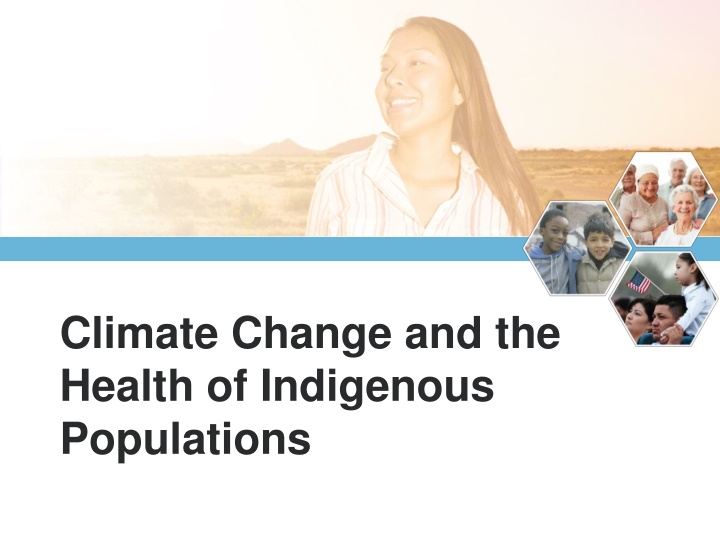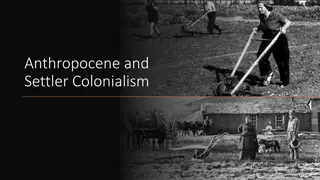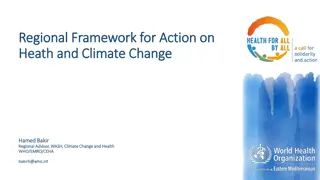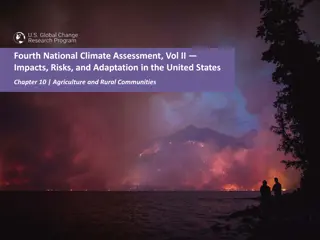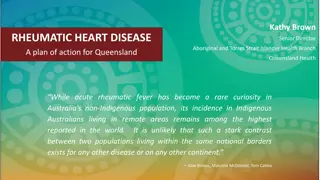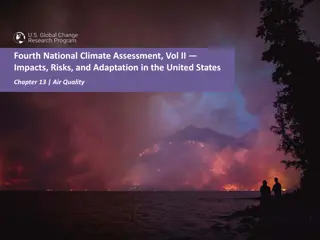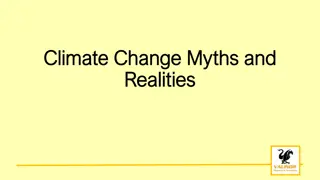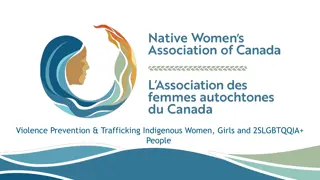Impact of Climate Change on Indigenous Health in the United States
Climate change poses significant risks to the health of Indigenous populations in the United States. The US Climate Health Assessment highlights these risks and emphasizes the vulnerability of tribal communities. Factors such as food insecurity, water scarcity, and air quality issues exacerbate existing health risks, particularly respiratory conditions. Indigenous groups are disproportionately affected by climate-related health effects due to their unique cultural practices and reliance on natural resources. Addressing these challenges requires targeted interventions to enhance community resilience and minimize health disparities.
Download Presentation

Please find below an Image/Link to download the presentation.
The content on the website is provided AS IS for your information and personal use only. It may not be sold, licensed, or shared on other websites without obtaining consent from the author.If you encounter any issues during the download, it is possible that the publisher has removed the file from their server.
You are allowed to download the files provided on this website for personal or commercial use, subject to the condition that they are used lawfully. All files are the property of their respective owners.
The content on the website is provided AS IS for your information and personal use only. It may not be sold, licensed, or shared on other websites without obtaining consent from the author.
E N D
Presentation Transcript
Climate Change and the Health of Indigenous Populations
The US Climate Health Assessment What is it? An assessment of the risks climate change poses to human health in the United States An Interagency product of the US Global Change Research Program (USGCRP) Part of the ongoing National Climate Assessment (NCA) process Who wrote it? A team of ~100 Federal employees, contractors, and grantees from eight U.S. Federal agencies: HHS (NIH, CDC, NIOSH, ASPR, FDA, SAMHSA), NOAA, EPA, USDA, NASA, USGS, DOD (USUHS), VA. Health2016.globalchange.gov Climate change is a significant threat to the health of the American people.
Vulnerability Vulnerability is the tendency or predisposition to be adversely affected by climate-related health effects, and encompasses three elements: exposure sensitivity or susceptibility to harm the capacity to adapt to or respond to a climate change threat. While all Americans are affected by climate change, some groups are disproportionately vulnerable to climate health impacts.
Climate Change & Tribal Communities Each tribal community and tribe is unique, but many have shared characteristics that can affect their ability to prepare for, respond to, and cope with the impacts of climate change on health. Some factors that contribute to vulnerability and risk of disproportionate impacts include: living in rural areas or places most affected by climate change (like communities along the coast) relying on surrounding environment and natural resources for food, cultural practices, and income coping with higher levels of existing health risks when compared to other groups having high rates of uninsured individuals, who have difficulty accessing quality health care living in isolated or low income communities with limited access to healthcare services
Tribal Health Risks Food Climate change will make it harder for tribes to access safe and nutritious food, including traditional foods important to many tribes cultural practices. Water Climate change may reduce availability of water and is expected to increase health risks associated with water quality problems like contamination, particularly during droughts.
Tribal Health Risks Air Climate change is expected to increase health risks associated with poor air quality, worsening asthma, allergies, chronic obstructive pulmonary disorder (COPD), and other respiratory conditions. In Indigenous populations, rates of these illnesses are higher than those of other racial and ethnic groups. Road, Buildings, and Land Increasing frequency or intensity of extreme weather events can damage electricity, water, communication, and transportation systems, which are important to maintaining access to health care and emergency response services.
For More Information Factsheet: Climate Change and the Health of Indigenous Populations www.epa.gov/climate-impacts/communicating- vulnerabilities-climate-change-indigenous- populations
Additional Resources EPA Resources: www.epa.gov/climate-impacts USGCRP Climate and Health Assessment: health2016.globalchange.gov
